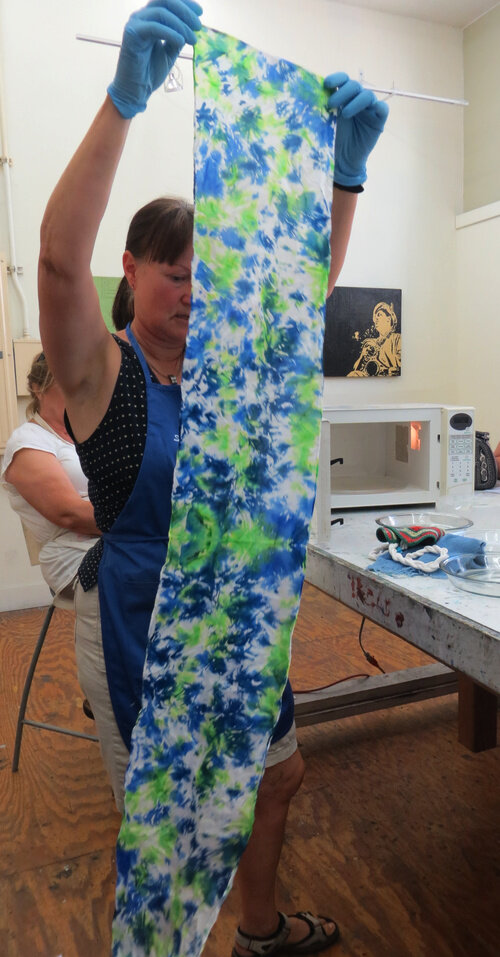Yes! You can dye silk in a microwave!
Materials:
silk
dyes for steam fixation
dropper
rubber gloves
white vinegar (for fixation and color brilliance)
microwave (600 watts power)
microwave dish and cover
Basics of dying using a microwave:
always remove the tag from a scarf
wet silk with vinegar and squeeze out excess vinegar
place silk on plate in desired pattern
drip or paint dyes onto silk
place the plate with the wet silk into the microwave and cover with a lid
heat the silk for 4 to 6 minutes at 600 watts in the microwave
take the plate out of the microwave
It is ok if the silk is still damp. Let it drywash the silk and iron it dry
NOTE:
4 to 6 minutes is the average heating time recommended. Since each microwave is different start with less time. Experiment to figure out the right amount of minutes for your microwave by checking after 1 to 2 minutes and add time depending on the moisture of the silk.
Depending on the size and weight of the silk you need more or less time. If you take the plate out of the microwave be very careful and use pot holders. Also, if you lift the lid the emitting steam and the silk are very hot!
Crash technique (free form):
dip silk into vinegar and place onto plate
gather silk into “mountains and valleys”
drip dyes onto the silk
press the dyes into the silk if desired
check the bottom side of the silk to see if this side of the silk is soaked with dye. If necessary, flip the silk over and add dye.
place the plate with the wet silk into the microwave and cover with a lid
heat the silk for 4 to 6 minutes at 600 watts
take the plate out of the microwave
It is ok if the silk is still damp. Let it dry.wash the silk and iron it dry
NOTE:
Arranging the silk in different ways results in different patterns. (E.g. folding, turning or winding, placing silk on a table and gathering into folds…) Choose a nice color combination. Avoid using too many different colors because they will all mix with each other on the silk. You can repeat the process a couple of times until you like the results.
Background painting:
Microwave dying is suited for background or foundation painting
Method
follow the “Crash Technique” instructions using just one color
press the dye onto the silk
place the plate with the wet silk into the microwave and cover with a lid
heat the silk for 4 to 6 minutes by 600 watts
Method
pour vinegar in a bowl and add dye
soak the silk in the vinegar dye mix
squeeze out excess fluid
place the plate with the wet silk into the microwave and cover with a lid
heat the silk for 4 to 6 minutes by 600 watts
let dry and paint the silk in desired techniques (e.g. using traditional techniques like resist, layering, Shibori…)
Shibori:
Most Shibori techniques can be done in the microwave:
twisting - clamping - pleating - folding - tying
Note: No tools with metal! Just use clothes pins without a metal spring. Most of these techniques require more dye than the other methods.
prepare the dry silk in the desired technique
soak in vinegar
drip dyes onto silk and press into the silk
The more you press the less of the silk remains white.place the plate with the wet silk into the microwave and cover with a lid
heat the silk for 4 to 6 minutes at 600 watts
take the plate out of the microwave.
It is okay if the silk is still damp. Let it dry.wash the silk and iron it dry
Salt effect technique:
stretch silk to a frame
color the silk with dyes and sprinkle salt onto the wet fabric
let the salt “work” until the silk is dry
remove salt
put fixation paper under the silk which is still stretched to the frame
wet the silk with vinegar using a wide foam brush
loosen the silk from the frame and let it down onto the fixation paper
add fixation paper on the top of the silk
roll up the paper with the silk
place the rolled silk onto a microwave dish, add a cup with water and close with the lid
heat the silk for 4 to 6 minutes at 600 watts
take the plate out of the microwave.
It is okay if the silk is still damp. Let it dry.wash the silk and iron it dry
NOTE: Since the painted silk will be wet again the usually precise lines formed by salt will soften and partially dissolve.

